Boral Limited Annual Report 2017
Added on 2023-06-09
148 Pages76561 Words208 Views
BORAL LIMITED
ANNUAL REPORT
FOR THE YEAR
ENDED 30 JUNE 2017
BORAL
ANNUAL
REPORT
2017
ANNUAL REPORT
FOR THE YEAR
ENDED 30 JUNE 2017
BORAL
ANNUAL
REPORT
2017
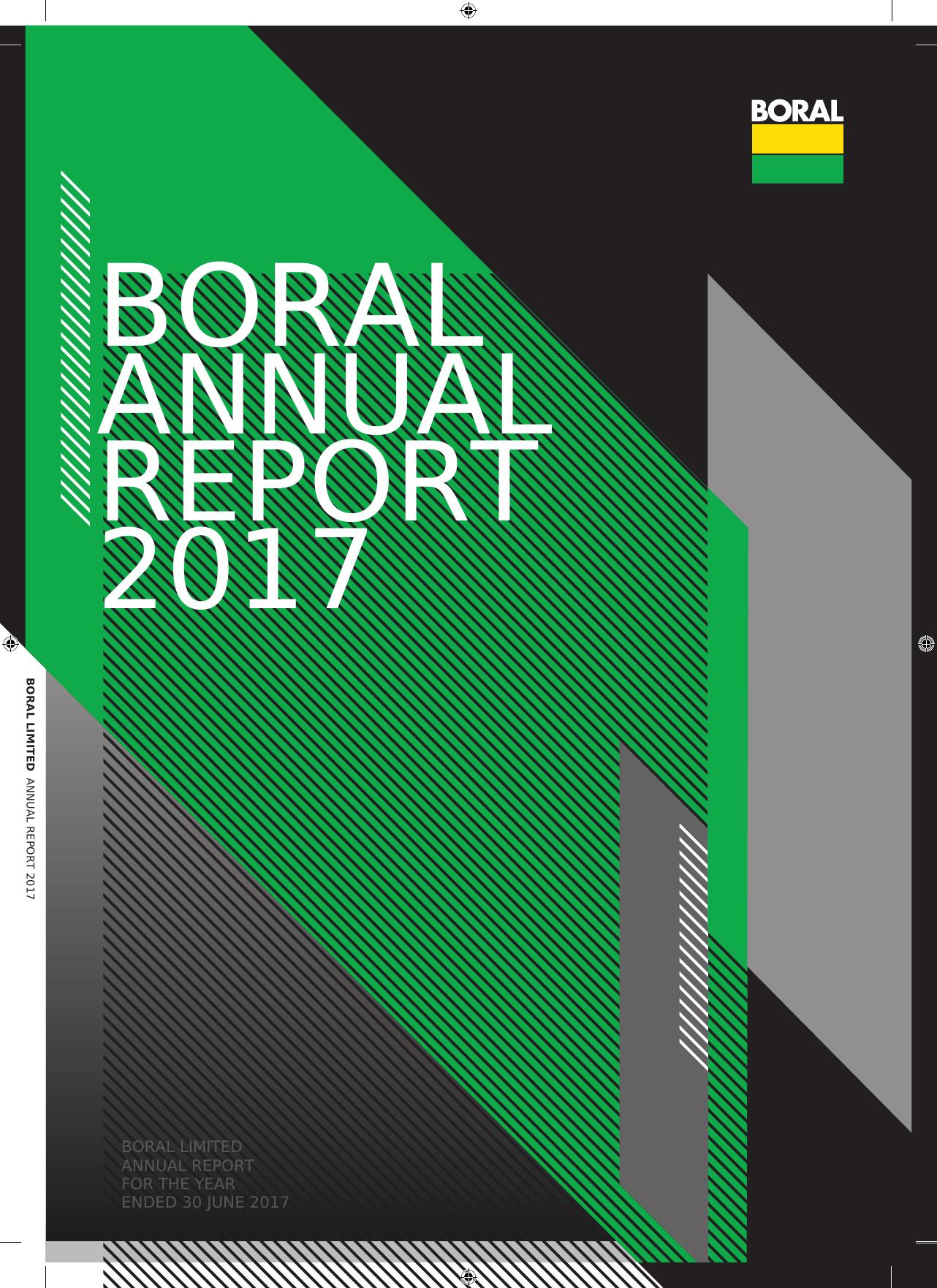
Boral Limited
ABN 13 008 421 761
Financial calendar
Please note, dates are subject to review.
Record date for final dividend 6 September 2017
Final dividend payable 3 October 2017
Annual General Meeting 2 November 2017
Half year end 31 December 2017
Half year results announcement 13 February 2018
Ex dividend share trading commences 19 February 2018
Record date for interim dividend 20 February 2018
Interim dividend payable 9 March 2018
Year end 30 June 2018
The Annual General Meeting
of Boral Limited will be held at
the Civic Pavilion, The Concourse,
Chatswood, NSW, on Thursday
2 November 2017 at 10.30am.
ABN 13 008 421 761
Financial calendar
Please note, dates are subject to review.
Record date for final dividend 6 September 2017
Final dividend payable 3 October 2017
Annual General Meeting 2 November 2017
Half year end 31 December 2017
Half year results announcement 13 February 2018
Ex dividend share trading commences 19 February 2018
Record date for interim dividend 20 February 2018
Interim dividend payable 9 March 2018
Year end 30 June 2018
The Annual General Meeting
of Boral Limited will be held at
the Civic Pavilion, The Concourse,
Chatswood, NSW, on Thursday
2 November 2017 at 10.30am.
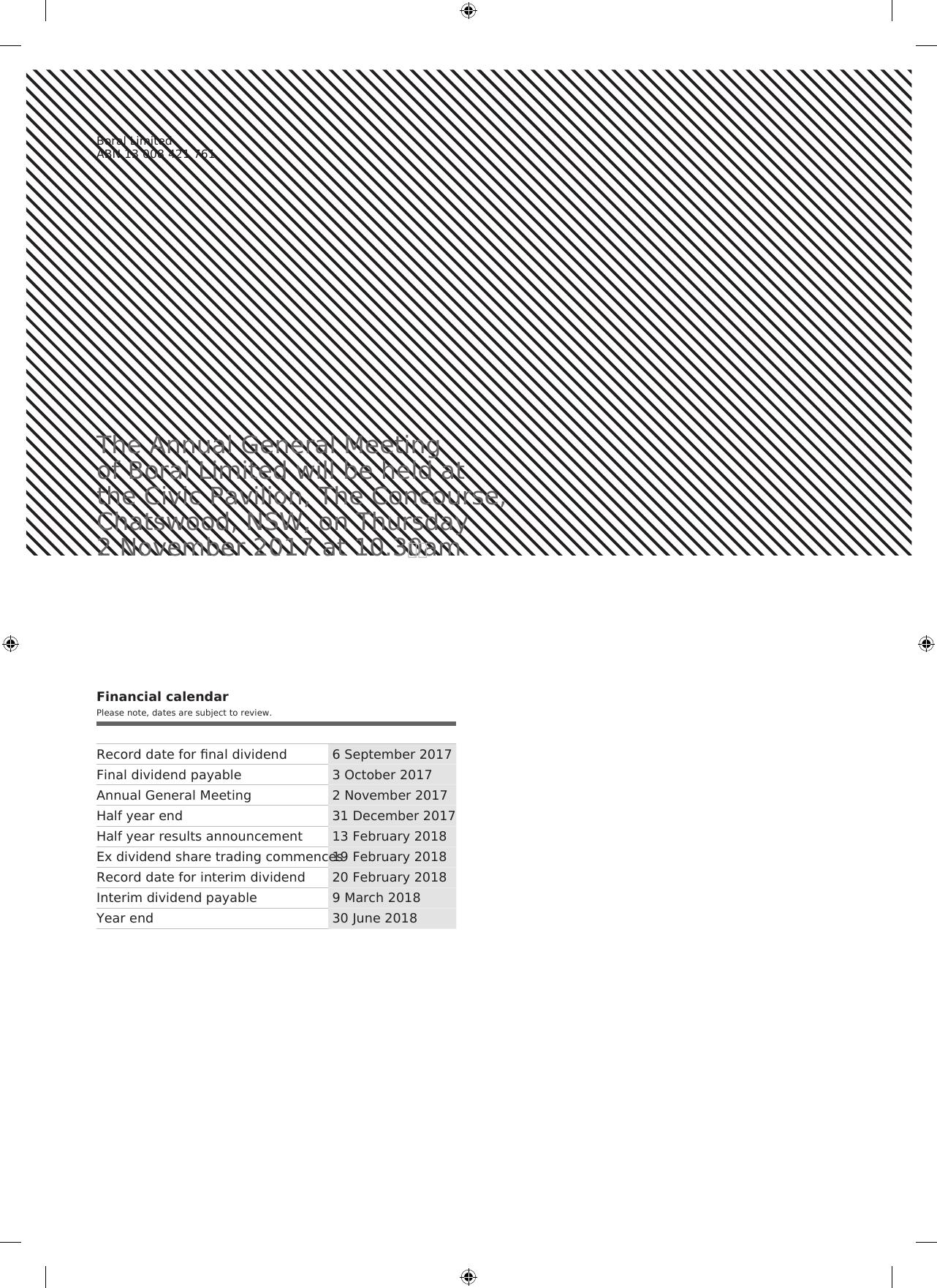
Boral Limited Annual Report 2017 1
Chairman’s Review 2
Chief Executive’s Review 4
Financial Review 6
Divisional Performance 10
Sustainability Overview 20
Executive Committee 28
Board of Directors 29
Corporate Governance 30
Directors’ Report 44
2017 Remuneration Report 51
Financial Statements 72
Statutory Statements 135
Shareholder Information 141
Financial History 144
Non-IFRS information
EBIT before significant items and net profit after tax before
significant items are non-IFRS measures used to provide
a greater understanding of the underlying performance of the
Group. This information has been extracted or derived from the
financial statements. Significant items are detailed in note 2.6
to the financial statements and relate to income and expenses
that are associated with significant business restructuring,
impairment or individual transactions.
The sections of our Annual Report titled Chairman’s Review,
Chief Executive’s Review, Financial Review and Divisional
Performance comprise our operating and financial review (OFR)
and form part of the Directors’ Report.
Boral Limited
Annual Report
For the year ended 30 June 2017
Chairman’s Review 2
Chief Executive’s Review 4
Financial Review 6
Divisional Performance 10
Sustainability Overview 20
Executive Committee 28
Board of Directors 29
Corporate Governance 30
Directors’ Report 44
2017 Remuneration Report 51
Financial Statements 72
Statutory Statements 135
Shareholder Information 141
Financial History 144
Non-IFRS information
EBIT before significant items and net profit after tax before
significant items are non-IFRS measures used to provide
a greater understanding of the underlying performance of the
Group. This information has been extracted or derived from the
financial statements. Significant items are detailed in note 2.6
to the financial statements and relate to income and expenses
that are associated with significant business restructuring,
impairment or individual transactions.
The sections of our Annual Report titled Chairman’s Review,
Chief Executive’s Review, Financial Review and Divisional
Performance comprise our operating and financial review (OFR)
and form part of the Directors’ Report.
Boral Limited
Annual Report
For the year ended 30 June 2017
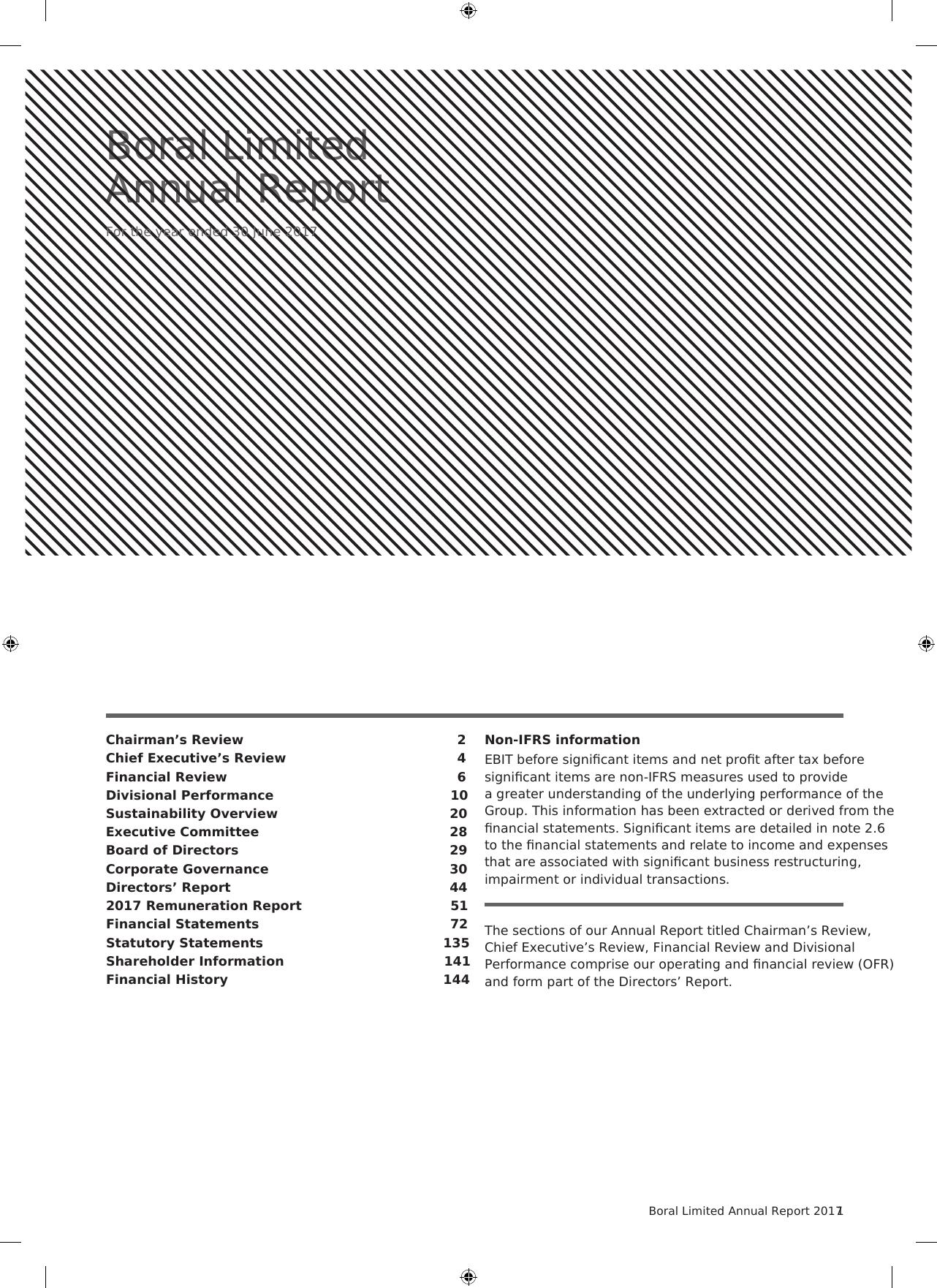
1. Before significant items.
2. ROFE is EBIT (excluding significant items) on funds employed as at
30 June. However, Boral’s Group FY2017 ROFE is based on the average
monthly funds employed to recognise the impact of the Headwaters
acquisition. USG Boral’s underlying ROFE is on an EBIT basis whereas
Boral’s Group reported ROFE includes post-tax earnings from USG Boral.
Boral Limited Annual Report 20172
From the
Chairman
CHAIRMAN’S
REVIEW For several years now, we have been
working to deliver performance
excellence, as well as more sustainable
growth, through strategic acquisitions
and innovation. In FY2017 we delivered
on both fronts.
Dr Brian Clark, Chairman
A year of strong performance
For the year ended 30 June 2017, sales revenue of $4.4 billion
was up 2% on the prior year, reflecting additional revenue from
Headwaters as well as growth in Australia and in the underlying
US business. Excluding US Bricks revenue in both years, which
is now equity accounted following the formation of the Meridian
Brick joint venture, revenue was up 8%.
Group EBIT1 increased 16% to $460 million and underlying profit
after tax1 increased by a substantial 28% to $343 million. The
result benefited from eight weeks of earnings from Headwaters
as well as underlying growth in all three divisions.
The reported profit result was also helped by a lower net interest
expense due to the positive cash balance for part of the year
following the equity raising, and a steady income tax expense
because of previously unrecognised tax losses and a benefit
arising from the vesting of long-term incentives.
Significant items of $46 million, primarily related to transaction
costs for the Headwaters acquisition, resulted in net profit after
tax after significant items of $297 million, up 16%.
Boral Australia delivered an EBIT return on funds employed
(ROFE 2
) of 14.6% for the year and USG Boral delivered
underlying ROFE 2 of 11.6% – strong divisional returns that
exceed the cost of capital. Returns from Boral North America
are expected to exceed the cost of capital in coming years, and
the Headwaters acquisition strengthens Boral’s ability to deliver
returns above the cost of capital through the cycle.
Boral’s ROFE 2 was 9.2% using the average monthly funds
employed for the year, compared with reported ROFE 2 of 9.0%
in FY2016.
Net debt at 30 June 2017 of $2.3 billion was up from $893
million last year due to the acquisition of Headwaters.
A year of transformation for Boral
As you may recall, a year ago I said that we were assessing
strategic merger and acquisition (M&A) opportunities,
particularly in the USA, where Boral has four decades
of experience.
After months of rigorous due diligence, the Board determined
that Headwaters Inc. presented a compelling acquisition
opportunity for Boral, offering substantial long-term value
creation for shareholders. It presented an undeniably strong
fit with Boral’s existing business and was well-aligned with our
strategic goals.
On 21 November 2016, we announced the transaction and a
A$2 billion capital raising.
Your support for this transformative strategic move was
overwhelming and for that, your Board thanks you.
Completed on 8 May 2017, the acquisition more than
doubles our position in the USA, increasing Boral’s product
offerings, geographic breadth, multi-channel distribution and
diversification across broader and growing US construction
markets.
We expect in excess of US$100 million per annum of synergies
within four years, including US$30–35 million in the first full year.
We are pleased with how the initial period of integration has
progressed and, in line with guidance, Headwaters contributed
US$21 million to Boral’s earnings before interest and tax (EBIT1
)
in FY2017, representing the first eight weeks of consolidation.
2. ROFE is EBIT (excluding significant items) on funds employed as at
30 June. However, Boral’s Group FY2017 ROFE is based on the average
monthly funds employed to recognise the impact of the Headwaters
acquisition. USG Boral’s underlying ROFE is on an EBIT basis whereas
Boral’s Group reported ROFE includes post-tax earnings from USG Boral.
Boral Limited Annual Report 20172
From the
Chairman
CHAIRMAN’S
REVIEW For several years now, we have been
working to deliver performance
excellence, as well as more sustainable
growth, through strategic acquisitions
and innovation. In FY2017 we delivered
on both fronts.
Dr Brian Clark, Chairman
A year of strong performance
For the year ended 30 June 2017, sales revenue of $4.4 billion
was up 2% on the prior year, reflecting additional revenue from
Headwaters as well as growth in Australia and in the underlying
US business. Excluding US Bricks revenue in both years, which
is now equity accounted following the formation of the Meridian
Brick joint venture, revenue was up 8%.
Group EBIT1 increased 16% to $460 million and underlying profit
after tax1 increased by a substantial 28% to $343 million. The
result benefited from eight weeks of earnings from Headwaters
as well as underlying growth in all three divisions.
The reported profit result was also helped by a lower net interest
expense due to the positive cash balance for part of the year
following the equity raising, and a steady income tax expense
because of previously unrecognised tax losses and a benefit
arising from the vesting of long-term incentives.
Significant items of $46 million, primarily related to transaction
costs for the Headwaters acquisition, resulted in net profit after
tax after significant items of $297 million, up 16%.
Boral Australia delivered an EBIT return on funds employed
(ROFE 2
) of 14.6% for the year and USG Boral delivered
underlying ROFE 2 of 11.6% – strong divisional returns that
exceed the cost of capital. Returns from Boral North America
are expected to exceed the cost of capital in coming years, and
the Headwaters acquisition strengthens Boral’s ability to deliver
returns above the cost of capital through the cycle.
Boral’s ROFE 2 was 9.2% using the average monthly funds
employed for the year, compared with reported ROFE 2 of 9.0%
in FY2016.
Net debt at 30 June 2017 of $2.3 billion was up from $893
million last year due to the acquisition of Headwaters.
A year of transformation for Boral
As you may recall, a year ago I said that we were assessing
strategic merger and acquisition (M&A) opportunities,
particularly in the USA, where Boral has four decades
of experience.
After months of rigorous due diligence, the Board determined
that Headwaters Inc. presented a compelling acquisition
opportunity for Boral, offering substantial long-term value
creation for shareholders. It presented an undeniably strong
fit with Boral’s existing business and was well-aligned with our
strategic goals.
On 21 November 2016, we announced the transaction and a
A$2 billion capital raising.
Your support for this transformative strategic move was
overwhelming and for that, your Board thanks you.
Completed on 8 May 2017, the acquisition more than
doubles our position in the USA, increasing Boral’s product
offerings, geographic breadth, multi-channel distribution and
diversification across broader and growing US construction
markets.
We expect in excess of US$100 million per annum of synergies
within four years, including US$30–35 million in the first full year.
We are pleased with how the initial period of integration has
progressed and, in line with guidance, Headwaters contributed
US$21 million to Boral’s earnings before interest and tax (EBIT1
)
in FY2017, representing the first eight weeks of consolidation.
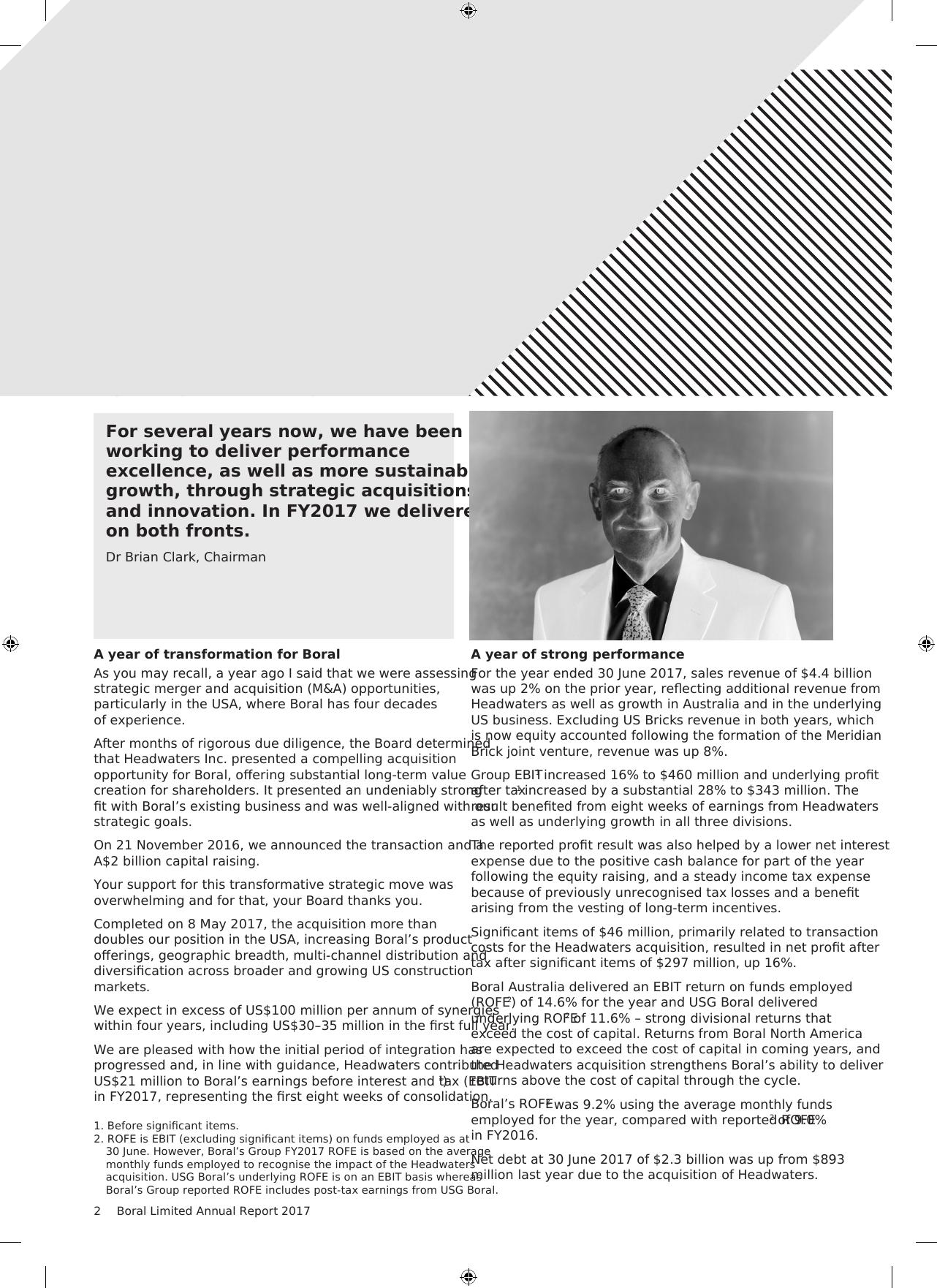
Boral Limited Annual Report 2017 3
However, Boral remains well within its funding covenants and
our balance sheet remains robust.
The Board declared a final dividend of 12.0 cents per share,
which was 50% franked, for a full year dividend of 24.0 cents
per share. This represents a payout ratio for the full year of
82%. While this exceeds Boral’s Dividend Policy of between
50% and 70% of earnings before significant items, subject
to the Company’s financial position, it is in line with Boral’s
commitment to maintain the level of dividends while the
Headwaters acquisition was being finalised.
Boral delivered a total shareholder return 3 of 23.4% for the year
– ahead of the average of 16.9% for ASX 100 companies.
A strong safety culture
The transformation of Boral to deliver performance excellence
includes targeting world class health and safety outcomes
based on Zero Harm.
In FY2017, Boral’s safety performance as measured by a
recordable injury frequency rate (RIFR4
) of 8.1 improved by 8%,
and compares with a rate of 19.0 in FY2012.
Boral’s lost time injury frequency rate (LTIFR4
) at 1.5 is down
from 1.8 in FY2012 but up slightly from 1.3 in FY2016 – a
reminder that there is still work to do.
The Board
Boral’s Board benefits from diversity of gender, tenure and
experience across a range of sectors, functions and professions.
While the Board was stable during FY2017, we have been
developing succession plans and identifying opportunities to
strengthen certain Board skills and experience over time.
During the year, the Board spent time with Boral’s people and
visited several operations, providing the opportunity to see
first-hand how we are managing safety, quality, operations and
employee engagement. We are encouraged by what we
have seen.
In March 2017, the Board visited USG Boral in India and
Thailand. The visit to the Research & Development Centre in
Saraburi reinforced for us the strength of our innovation efforts
and the technical talent we have in our organisation.
In September this year, all members of the Board will spend
several days in various parts of the North American business,
meeting our people and inspecting our operations. This will
provide another opportunity to assess the integration program
and early progress against delivery of synergies.
Shareholder feedback on Remuneration Report
At our 2016 Annual General Meeting, the Board received a
clear message from shareholders, with 26% voting against
our Remuneration Report, constituting a “first strike” for the
purposes of the Corporations Act 2001.
The basis for the “first strike” was primarily the one-off targeted
retention incentives for eight key executives, to ensure stable
leadership. While all eight executives remain highly engaged
in Boral’s transformation agenda, the Board understands
shareholders’ views and we are committed to no further
retention awards.
We have taken on board feedback received from shareholders
and as a result, I expect that our 2017 Remuneration Report
will be more widely supported. Details of the issues raised and
changes made are communicated in this year’s Remuneration
Report on pages 51 to 71.
A key change made during the year was the restructuring
of CEO & Managing Director Mike Kane’s remuneration
arrangements. The new arrangements reflect the fact that
he is now spending approximately half his time in the USA,
demonstrating the importance of Headwaters integration and
synergy delivery to Boral’s future growth.
Boral is Australian-listed and headquartered in Sydney and
as such, we continue to remunerate the CEO having regard
to Australian practice. The increased time Mike is spending in
North America provides an opportunity to pay him out of the
USA. This has allowed us to cease paying expatriate benefits
and associated fringe benefits tax, which has impacted the level
and positioning of the CEO’s fixed pay.
Boral’s people
The Board has every confidence in Mike’s leadership and we
commend him for the excellent job he has done over the past
five years as Boral’s CEO. Following discussions with Mike, the
Board currently expects he will continue in the role for another
three to five years.
In the meantime, Boral’s CEO succession development program
continues and executives have taken on more responsibilities
and increased role complexity.
At the start of FY2017, Joe Goss took on the new position of
Divisional Chief Executive, Boral Australia, as a result of the
Boral Building Products and Construction Materials & Cement
divisions coming together.
Also effective 1 July 2016 was the promotion of David Mariner
from Executive General Manager, Building Products in Australia
to President & CEO, Boral North America.
Ros Ng, Boral’s Chief Financial Officer, took on a larger and
more complex role, including responsibility for the Corporate
Development and M&A function and project management of the
Headwaters transaction.
Together with Frederic de Rougemont, who has demonstrated
excellent leadership as CEO of USG Boral, these key executives,
and the other members of the Executive Committee, and all
of Boral’s people, are to be congratulated for their efforts and
commitment to delivering Boral’s goals and strategic priorities.
I thank Mike Kane and all of Boral’s people for delivering strong
results in FY2017, with safety at the forefront.
Dr Brian Clark
Chairman
3. Total shareholder return based on share price appreciation, dividends and
franking benefits.
4. Per million hours worked. Includes employees and contractors in
100%-owned businesses and 50%-owned joint venture businesses.
However, Boral remains well within its funding covenants and
our balance sheet remains robust.
The Board declared a final dividend of 12.0 cents per share,
which was 50% franked, for a full year dividend of 24.0 cents
per share. This represents a payout ratio for the full year of
82%. While this exceeds Boral’s Dividend Policy of between
50% and 70% of earnings before significant items, subject
to the Company’s financial position, it is in line with Boral’s
commitment to maintain the level of dividends while the
Headwaters acquisition was being finalised.
Boral delivered a total shareholder return 3 of 23.4% for the year
– ahead of the average of 16.9% for ASX 100 companies.
A strong safety culture
The transformation of Boral to deliver performance excellence
includes targeting world class health and safety outcomes
based on Zero Harm.
In FY2017, Boral’s safety performance as measured by a
recordable injury frequency rate (RIFR4
) of 8.1 improved by 8%,
and compares with a rate of 19.0 in FY2012.
Boral’s lost time injury frequency rate (LTIFR4
) at 1.5 is down
from 1.8 in FY2012 but up slightly from 1.3 in FY2016 – a
reminder that there is still work to do.
The Board
Boral’s Board benefits from diversity of gender, tenure and
experience across a range of sectors, functions and professions.
While the Board was stable during FY2017, we have been
developing succession plans and identifying opportunities to
strengthen certain Board skills and experience over time.
During the year, the Board spent time with Boral’s people and
visited several operations, providing the opportunity to see
first-hand how we are managing safety, quality, operations and
employee engagement. We are encouraged by what we
have seen.
In March 2017, the Board visited USG Boral in India and
Thailand. The visit to the Research & Development Centre in
Saraburi reinforced for us the strength of our innovation efforts
and the technical talent we have in our organisation.
In September this year, all members of the Board will spend
several days in various parts of the North American business,
meeting our people and inspecting our operations. This will
provide another opportunity to assess the integration program
and early progress against delivery of synergies.
Shareholder feedback on Remuneration Report
At our 2016 Annual General Meeting, the Board received a
clear message from shareholders, with 26% voting against
our Remuneration Report, constituting a “first strike” for the
purposes of the Corporations Act 2001.
The basis for the “first strike” was primarily the one-off targeted
retention incentives for eight key executives, to ensure stable
leadership. While all eight executives remain highly engaged
in Boral’s transformation agenda, the Board understands
shareholders’ views and we are committed to no further
retention awards.
We have taken on board feedback received from shareholders
and as a result, I expect that our 2017 Remuneration Report
will be more widely supported. Details of the issues raised and
changes made are communicated in this year’s Remuneration
Report on pages 51 to 71.
A key change made during the year was the restructuring
of CEO & Managing Director Mike Kane’s remuneration
arrangements. The new arrangements reflect the fact that
he is now spending approximately half his time in the USA,
demonstrating the importance of Headwaters integration and
synergy delivery to Boral’s future growth.
Boral is Australian-listed and headquartered in Sydney and
as such, we continue to remunerate the CEO having regard
to Australian practice. The increased time Mike is spending in
North America provides an opportunity to pay him out of the
USA. This has allowed us to cease paying expatriate benefits
and associated fringe benefits tax, which has impacted the level
and positioning of the CEO’s fixed pay.
Boral’s people
The Board has every confidence in Mike’s leadership and we
commend him for the excellent job he has done over the past
five years as Boral’s CEO. Following discussions with Mike, the
Board currently expects he will continue in the role for another
three to five years.
In the meantime, Boral’s CEO succession development program
continues and executives have taken on more responsibilities
and increased role complexity.
At the start of FY2017, Joe Goss took on the new position of
Divisional Chief Executive, Boral Australia, as a result of the
Boral Building Products and Construction Materials & Cement
divisions coming together.
Also effective 1 July 2016 was the promotion of David Mariner
from Executive General Manager, Building Products in Australia
to President & CEO, Boral North America.
Ros Ng, Boral’s Chief Financial Officer, took on a larger and
more complex role, including responsibility for the Corporate
Development and M&A function and project management of the
Headwaters transaction.
Together with Frederic de Rougemont, who has demonstrated
excellent leadership as CEO of USG Boral, these key executives,
and the other members of the Executive Committee, and all
of Boral’s people, are to be congratulated for their efforts and
commitment to delivering Boral’s goals and strategic priorities.
I thank Mike Kane and all of Boral’s people for delivering strong
results in FY2017, with safety at the forefront.
Dr Brian Clark
Chairman
3. Total shareholder return based on share price appreciation, dividends and
franking benefits.
4. Per million hours worked. Includes employees and contractors in
100%-owned businesses and 50%-owned joint venture businesses.
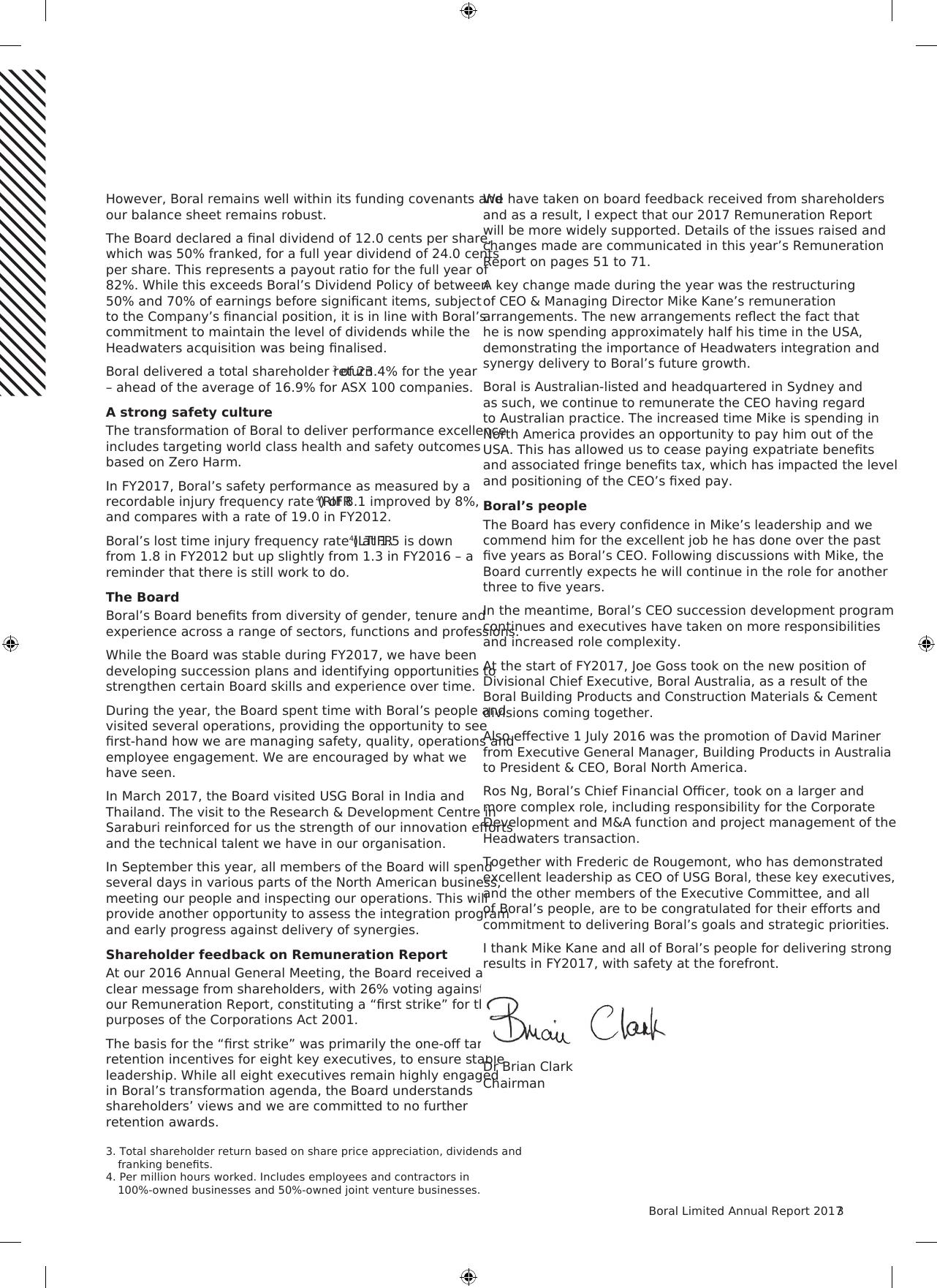
Boral Limited Annual Report 20174
Boral North America delivered an EBIT1 of A$66 million (or
US$50 million), which was 50% higher than the prior year. This
included an EBIT contribution of US$21 million from Headwaters,
which was consolidated from 8 May 2017, with benefits also
from price and volume gains in the underlying business.
Boral delivered a credible safety result for the year, with a further
8% reduction in recordable injury frequency rate to 8.1 and a lost
time injury frequency rate of 1.52
.
A strong FY2018 outlook
Boral's outlook for FY2018 is encouraging:
• Boral Australia is expected to deliver further EBIT growth
(excluding Property earnings in both years), underpinned by
the uplift in roads and infrastructure activity and continued
margin improvements. The contribution from Property in
FY2018 is expected to be at the lower end of the $8 million
to $46 million EBIT range of the past five years.
• USG Boral is expected to deliver continued earnings growth
supported by the strength of Sheetrock ® delivering price,
volume and cost benefits. While Indonesia and Thailand
should improve, residential activity in Australia and Korea
should soften. Overall, profit should grow in FY2018 at a
high single-digit rate.
• Boral North America is expected to deliver significant EBIT
growth with a full year from Headwaters and year one
synergies of ~US$30–35 million, in addition to underlying
market growth.
A year of significant progress
The US$2.6 billion Headwaters acquisition, completed in May
2017, is a major milestone in Boral’s transformation.
It strengthens Boral as a global building products and
construction materials group with three very strong divisions.
We have our high-performing, well-positioned Boral Australia
capitalising on a growing pipeline of infrastructure work and
strength in other construction markets. We have our fast-
growing USG Boral business in Asia, Australasia and the Middle
East, which is leading the way in product innovation in attractive,
high growth markets. And now we have Boral North America
– a scaled building products and fly ash business with greater
geographic reach, more diverse product offerings and strong
growth prospects.
Our strategy to position Boral for improved performance and
growth is delivering benefits, as reflected in the 28% increase
in underlying profit after tax1 to $343 million for the year and
the 16% increase in earnings before interest and tax (EBIT1
) to
$460 million. The lift in EBIT comprises 7% from eight weeks
of earnings from Headwaters, and 9% from growth in the
underlying businesses.
Boral Australia’s EBIT1 of $349 million was up 11% on last
year, with strong east coast volumes, pricing gains and margin
improvements supported by growth in infrastructure activity.
USG Boral delivered an impressive 18% increase in post-tax
equity income to $70 million and a 21% lift in underlying EBIT1 to
$217 million, reflecting its strength in manufacturing, distribution
and technology across its markets. This outstanding business is
delivering on its growth and performance promises.
CHIEF EXECUTIVE’S
REVIEW
Message from
Mike KaneBuilding a transformative culture is the
enabler we need to continue this journey
to Build something great for Boral’s
shareholders, customers, employees
and the communities in which
we operate.
Mike Kane, CEO & Managing Director
1. Before significant items.
2. Per million hours worked. Includes employees and contractors in
100%-owned businesses and 50%-owned joint venture businesses.
Boral North America delivered an EBIT1 of A$66 million (or
US$50 million), which was 50% higher than the prior year. This
included an EBIT contribution of US$21 million from Headwaters,
which was consolidated from 8 May 2017, with benefits also
from price and volume gains in the underlying business.
Boral delivered a credible safety result for the year, with a further
8% reduction in recordable injury frequency rate to 8.1 and a lost
time injury frequency rate of 1.52
.
A strong FY2018 outlook
Boral's outlook for FY2018 is encouraging:
• Boral Australia is expected to deliver further EBIT growth
(excluding Property earnings in both years), underpinned by
the uplift in roads and infrastructure activity and continued
margin improvements. The contribution from Property in
FY2018 is expected to be at the lower end of the $8 million
to $46 million EBIT range of the past five years.
• USG Boral is expected to deliver continued earnings growth
supported by the strength of Sheetrock ® delivering price,
volume and cost benefits. While Indonesia and Thailand
should improve, residential activity in Australia and Korea
should soften. Overall, profit should grow in FY2018 at a
high single-digit rate.
• Boral North America is expected to deliver significant EBIT
growth with a full year from Headwaters and year one
synergies of ~US$30–35 million, in addition to underlying
market growth.
A year of significant progress
The US$2.6 billion Headwaters acquisition, completed in May
2017, is a major milestone in Boral’s transformation.
It strengthens Boral as a global building products and
construction materials group with three very strong divisions.
We have our high-performing, well-positioned Boral Australia
capitalising on a growing pipeline of infrastructure work and
strength in other construction markets. We have our fast-
growing USG Boral business in Asia, Australasia and the Middle
East, which is leading the way in product innovation in attractive,
high growth markets. And now we have Boral North America
– a scaled building products and fly ash business with greater
geographic reach, more diverse product offerings and strong
growth prospects.
Our strategy to position Boral for improved performance and
growth is delivering benefits, as reflected in the 28% increase
in underlying profit after tax1 to $343 million for the year and
the 16% increase in earnings before interest and tax (EBIT1
) to
$460 million. The lift in EBIT comprises 7% from eight weeks
of earnings from Headwaters, and 9% from growth in the
underlying businesses.
Boral Australia’s EBIT1 of $349 million was up 11% on last
year, with strong east coast volumes, pricing gains and margin
improvements supported by growth in infrastructure activity.
USG Boral delivered an impressive 18% increase in post-tax
equity income to $70 million and a 21% lift in underlying EBIT1 to
$217 million, reflecting its strength in manufacturing, distribution
and technology across its markets. This outstanding business is
delivering on its growth and performance promises.
CHIEF EXECUTIVE’S
REVIEW
Message from
Mike KaneBuilding a transformative culture is the
enabler we need to continue this journey
to Build something great for Boral’s
shareholders, customers, employees
and the communities in which
we operate.
Mike Kane, CEO & Managing Director
1. Before significant items.
2. Per million hours worked. Includes employees and contractors in
100%-owned businesses and 50%-owned joint venture businesses.
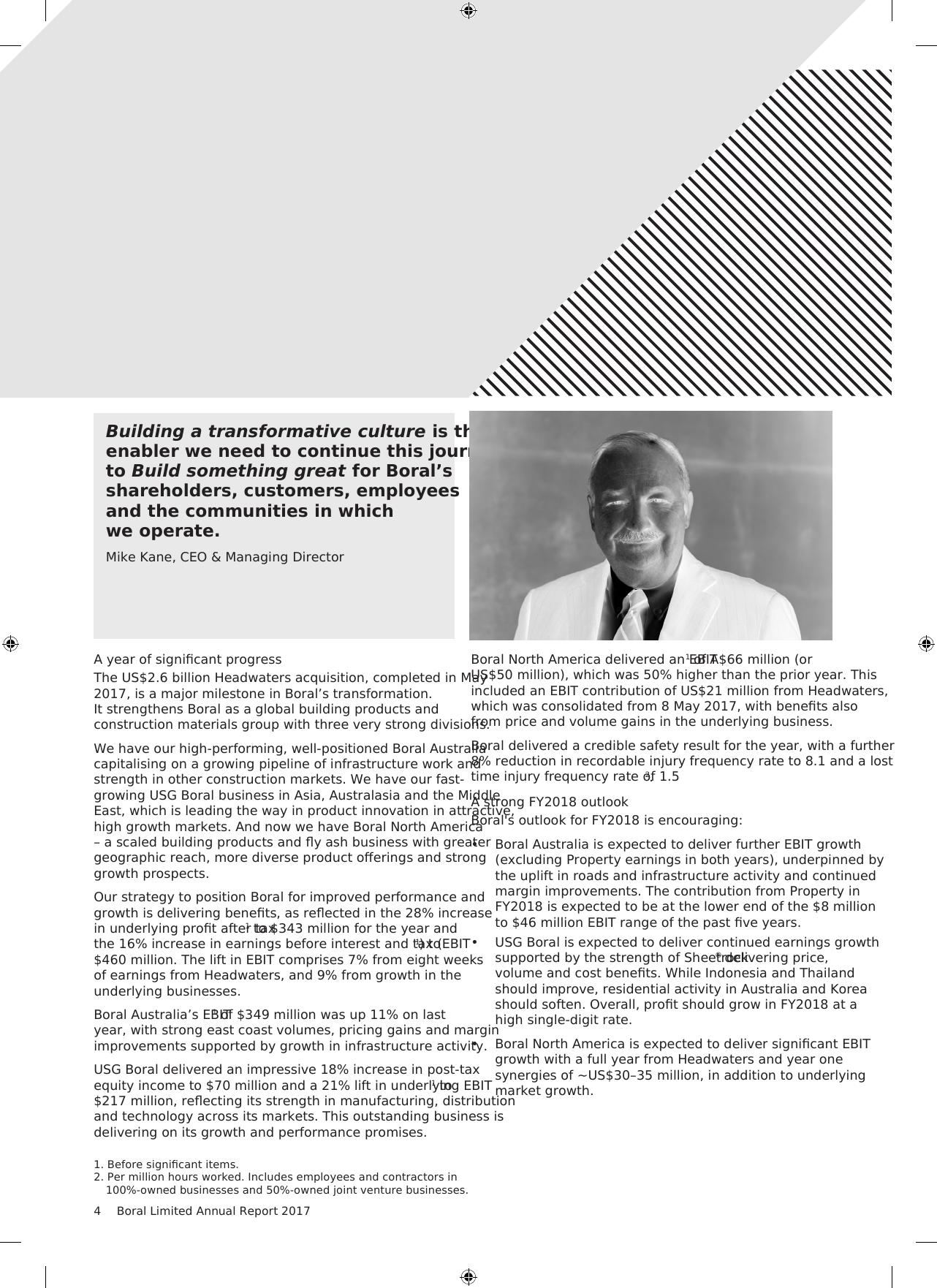
Boral Limited Annual Report 2017 5
Building a transformative culture
In 2010, we introduced Boral’s tagline – Build something great –
and we are continuing to do that.
Over the past five years, through our Fix, Execute, Transform
program, we have been fixing the things that have been
holding us back, refining our operational execution skills and
transforming the way Boral does business, including our
product portfolio.
Our values of Excellence, Integrity, Collaboration and Endurance
have underpinned our approach, and they are best captured in
our commitment to keep our people safe at work, reflected in
our Zero Harm Today mission which is shared by all
employees, collectively.
In 2017, we are taking the next step in our strategy, with an
even greater emphasis on our customers, a commitment to
innovation, and an enhanced ability to capture growth and
drive change.
We have a new strategic framework to support the organisation
in its direction and decision-making – we are Building a
transformative culture. The culture we are building can be
defined by the words: agility, grit, transparency and courage.
Agility means we will be nimble and responsive to a changing
world. Grit is having the mental toughness and persistence
to deliver excellence without giving up. Transparency means
being truthful, inclusive and straightforward in our approach.
And fostering courage among our people will drive us forward
in the face of challenges and help us to embrace risk in order to
achieve great things.
A transformative culture is one that looks beyond the horizon,
identifies threats and opportunities, and shapes itself to respond
to traditional, commercial, technological, environmental and
other societal forces. These forces can be a positive catalyst
helping us deliver on our uncompromising commitments
to our shareholders, the communities in which we operate,
our customers who we serve, our fellow employees and the
environment, which we have an obligation to protect.
Reducing our footprint while growing our business
As part of Boral’s transformation, while we have fundamentally
altered our portfolio to better compete across mature and
maturing markets, we are taking the lead on a less energy- and
less resource-intensive path, taking advantage of opportunities
to be more sustainable.
We have identified attractive positions for sustained value
creation in our traditional Australian materials business. We
are able to formulate solutions for our customers using the
latest in materials science to deliver lighter-weight, higher-
strength materials with lower environmental impacts and greater
productivity options around speed, space and total cost.
Across Asia, Australasia and the Middle East, we are delivering
game-changing performance characteristics in plasterboard-
based products: lighter weight, greater strength and superior
sag resistance. At the same time, we are on track to dramatically
reduce water, energy and raw material usage through globally
patented proprietary technologies.
In North America, we are the unquestioned leader in fly
ash technologies, enhancing the use of coal combustion
by-products in construction. We have developed patented
technologies, using more than 70% recycled by-products in
our high-performing TruExteriorTM Trim and Siding. We have
reconfigured our portfolio around a platform of variable cost,
scalable processes with reduced carbon footprints that can
better compete at all points in the cycle. We have driven
efficiencies so that our more mature product manufacturing
facilities are consuming less energy and materials at the lowest
possible costs.
In all aspects of our business, we are proudly working to
Build something great, and Building a transformative culture
is the enabler we need to continue to do this for Boral’s
shareholders, customers, employees and the communities in
which we operate.
Mike Kane
CEO & Managing Director
OUR STRATEGY TO POSITION
BORAL FOR IMPROVED
PERFORMANCE AND GROWTH IS
DELIVERING BENEFITS
Building a transformative culture
In 2010, we introduced Boral’s tagline – Build something great –
and we are continuing to do that.
Over the past five years, through our Fix, Execute, Transform
program, we have been fixing the things that have been
holding us back, refining our operational execution skills and
transforming the way Boral does business, including our
product portfolio.
Our values of Excellence, Integrity, Collaboration and Endurance
have underpinned our approach, and they are best captured in
our commitment to keep our people safe at work, reflected in
our Zero Harm Today mission which is shared by all
employees, collectively.
In 2017, we are taking the next step in our strategy, with an
even greater emphasis on our customers, a commitment to
innovation, and an enhanced ability to capture growth and
drive change.
We have a new strategic framework to support the organisation
in its direction and decision-making – we are Building a
transformative culture. The culture we are building can be
defined by the words: agility, grit, transparency and courage.
Agility means we will be nimble and responsive to a changing
world. Grit is having the mental toughness and persistence
to deliver excellence without giving up. Transparency means
being truthful, inclusive and straightforward in our approach.
And fostering courage among our people will drive us forward
in the face of challenges and help us to embrace risk in order to
achieve great things.
A transformative culture is one that looks beyond the horizon,
identifies threats and opportunities, and shapes itself to respond
to traditional, commercial, technological, environmental and
other societal forces. These forces can be a positive catalyst
helping us deliver on our uncompromising commitments
to our shareholders, the communities in which we operate,
our customers who we serve, our fellow employees and the
environment, which we have an obligation to protect.
Reducing our footprint while growing our business
As part of Boral’s transformation, while we have fundamentally
altered our portfolio to better compete across mature and
maturing markets, we are taking the lead on a less energy- and
less resource-intensive path, taking advantage of opportunities
to be more sustainable.
We have identified attractive positions for sustained value
creation in our traditional Australian materials business. We
are able to formulate solutions for our customers using the
latest in materials science to deliver lighter-weight, higher-
strength materials with lower environmental impacts and greater
productivity options around speed, space and total cost.
Across Asia, Australasia and the Middle East, we are delivering
game-changing performance characteristics in plasterboard-
based products: lighter weight, greater strength and superior
sag resistance. At the same time, we are on track to dramatically
reduce water, energy and raw material usage through globally
patented proprietary technologies.
In North America, we are the unquestioned leader in fly
ash technologies, enhancing the use of coal combustion
by-products in construction. We have developed patented
technologies, using more than 70% recycled by-products in
our high-performing TruExteriorTM Trim and Siding. We have
reconfigured our portfolio around a platform of variable cost,
scalable processes with reduced carbon footprints that can
better compete at all points in the cycle. We have driven
efficiencies so that our more mature product manufacturing
facilities are consuming less energy and materials at the lowest
possible costs.
In all aspects of our business, we are proudly working to
Build something great, and Building a transformative culture
is the enabler we need to continue to do this for Boral’s
shareholders, customers, employees and the communities in
which we operate.
Mike Kane
CEO & Managing Director
OUR STRATEGY TO POSITION
BORAL FOR IMPROVED
PERFORMANCE AND GROWTH IS
DELIVERING BENEFITS
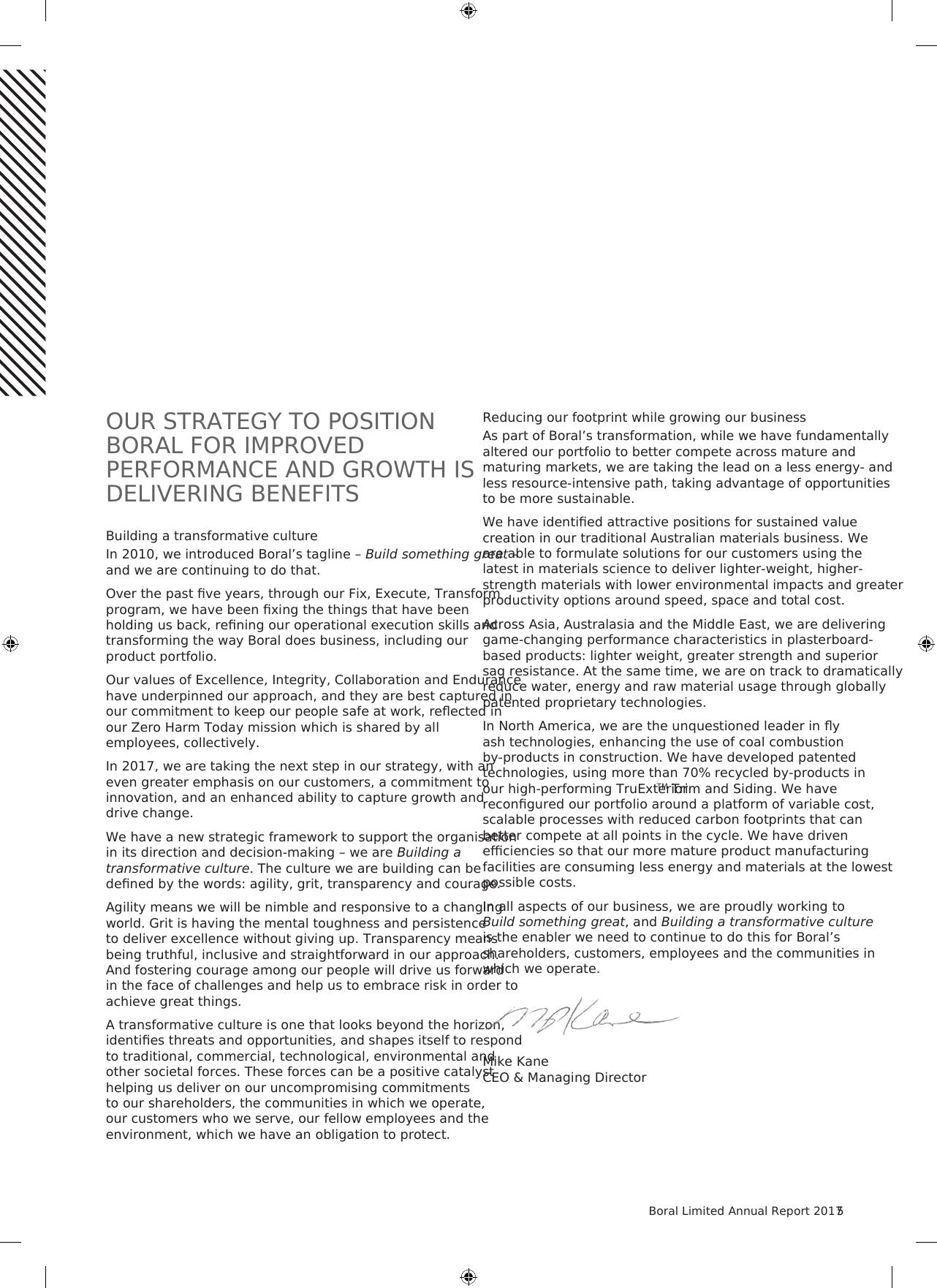
Boral Limited Annual Report 20176
FINANCIAL
REVIEW
• USG Boral underlying revenue of $1.48b was up 6% on
the prior year, driven by growth in premium Sheetrock ®
plasterboard sales and adjacent products. Strong board
volume, price and share growth in Korea and Australia were
partially offset by softer revenues in Indonesia, Thailand
and China.
• Boral North America revenue of A$1.09b was up 6% on
the prior year. This includes A$259m of revenue from
the recently acquired Headwaters business, as well as
the impact of the formation of the Meridian Brick JV.
Excluding these items, revenue increased 9%, benefiting
from increased US housing construction activity. Total US
housing starts increased by 4% to 1.20 million starts during
FY2017, with single family starts up 7%2
.
Financial performance
Revenue
Reported revenue of $4.39b was up 2% on the prior year, with
growth in Boral Australia and Boral North America including
eight weeks of revenues from Headwaters, partially offset
by reduced revenues from US bricks following the formation
of the Meridian Brick joint venture. Revenue from continuing
operations, which excludes US bricks revenue, was up 8%.
• Boral Australia revenue of $3.30b was up 1%, with strong
east coast residential construction, growing infrastructure
activity and price gains driving growth in Quarries, Concrete
and Asphalt. The market downturn in WA impacted Bricks
WA, with lower revenues also experienced in Timber
due to Cyclone Debbie, and Concrete Placing due to
the completion of major project work in Barangaroo and
Warringah Mall.
Income statement
Year ended 30 June 2017 2016
$ millions Group
Continuing
operations
Discontinued
operations Group
Continuing
operations
Discontinued
operations
Sales revenue 4,388.3 4,257.8 130.5 4,311.2 3,945.2 366.0
EBIT1 459.9 455.4 4.5 397.9 394.8 3.1
Finance costs1 (50.7) (50.7) – (63.2) (63.2) –
Tax benefit/(expense)1 (66.5) (66.7) 0.2 (66.7) (70.1) 3.4
Underlying profit after tax1 342.7 338.0 4.7 268.0 261.5 6.5
Net significant items (45.8) (88.4) 42.6 (12.0) (16.0) 4.0
Net profit after tax 296.9 249.6 47.3 256.0 245.5 10.5
1. Before significant items. EBIT before significant items is a non-IFRS
measure used to provide a greater understanding of the underlying
business performance of the Group. The disclosures are extracted
or derived from the audited financial statements.
2. US Census Bureau seasonally adjusted starts.
Report from
the CFOBoral delivered strong earnings growth,
underpinned by price increases, strong
infrastructure and residential activity
in Australia and the acquisition of
Headwaters, along with a continued
focus on cost improvements.
Rosaline Ng, Chief Financial Officer
FINANCIAL
REVIEW
• USG Boral underlying revenue of $1.48b was up 6% on
the prior year, driven by growth in premium Sheetrock ®
plasterboard sales and adjacent products. Strong board
volume, price and share growth in Korea and Australia were
partially offset by softer revenues in Indonesia, Thailand
and China.
• Boral North America revenue of A$1.09b was up 6% on
the prior year. This includes A$259m of revenue from
the recently acquired Headwaters business, as well as
the impact of the formation of the Meridian Brick JV.
Excluding these items, revenue increased 9%, benefiting
from increased US housing construction activity. Total US
housing starts increased by 4% to 1.20 million starts during
FY2017, with single family starts up 7%2
.
Financial performance
Revenue
Reported revenue of $4.39b was up 2% on the prior year, with
growth in Boral Australia and Boral North America including
eight weeks of revenues from Headwaters, partially offset
by reduced revenues from US bricks following the formation
of the Meridian Brick joint venture. Revenue from continuing
operations, which excludes US bricks revenue, was up 8%.
• Boral Australia revenue of $3.30b was up 1%, with strong
east coast residential construction, growing infrastructure
activity and price gains driving growth in Quarries, Concrete
and Asphalt. The market downturn in WA impacted Bricks
WA, with lower revenues also experienced in Timber
due to Cyclone Debbie, and Concrete Placing due to
the completion of major project work in Barangaroo and
Warringah Mall.
Income statement
Year ended 30 June 2017 2016
$ millions Group
Continuing
operations
Discontinued
operations Group
Continuing
operations
Discontinued
operations
Sales revenue 4,388.3 4,257.8 130.5 4,311.2 3,945.2 366.0
EBIT1 459.9 455.4 4.5 397.9 394.8 3.1
Finance costs1 (50.7) (50.7) – (63.2) (63.2) –
Tax benefit/(expense)1 (66.5) (66.7) 0.2 (66.7) (70.1) 3.4
Underlying profit after tax1 342.7 338.0 4.7 268.0 261.5 6.5
Net significant items (45.8) (88.4) 42.6 (12.0) (16.0) 4.0
Net profit after tax 296.9 249.6 47.3 256.0 245.5 10.5
1. Before significant items. EBIT before significant items is a non-IFRS
measure used to provide a greater understanding of the underlying
business performance of the Group. The disclosures are extracted
or derived from the audited financial statements.
2. US Census Bureau seasonally adjusted starts.
Report from
the CFOBoral delivered strong earnings growth,
underpinned by price increases, strong
infrastructure and residential activity
in Australia and the acquisition of
Headwaters, along with a continued
focus on cost improvements.
Rosaline Ng, Chief Financial Officer
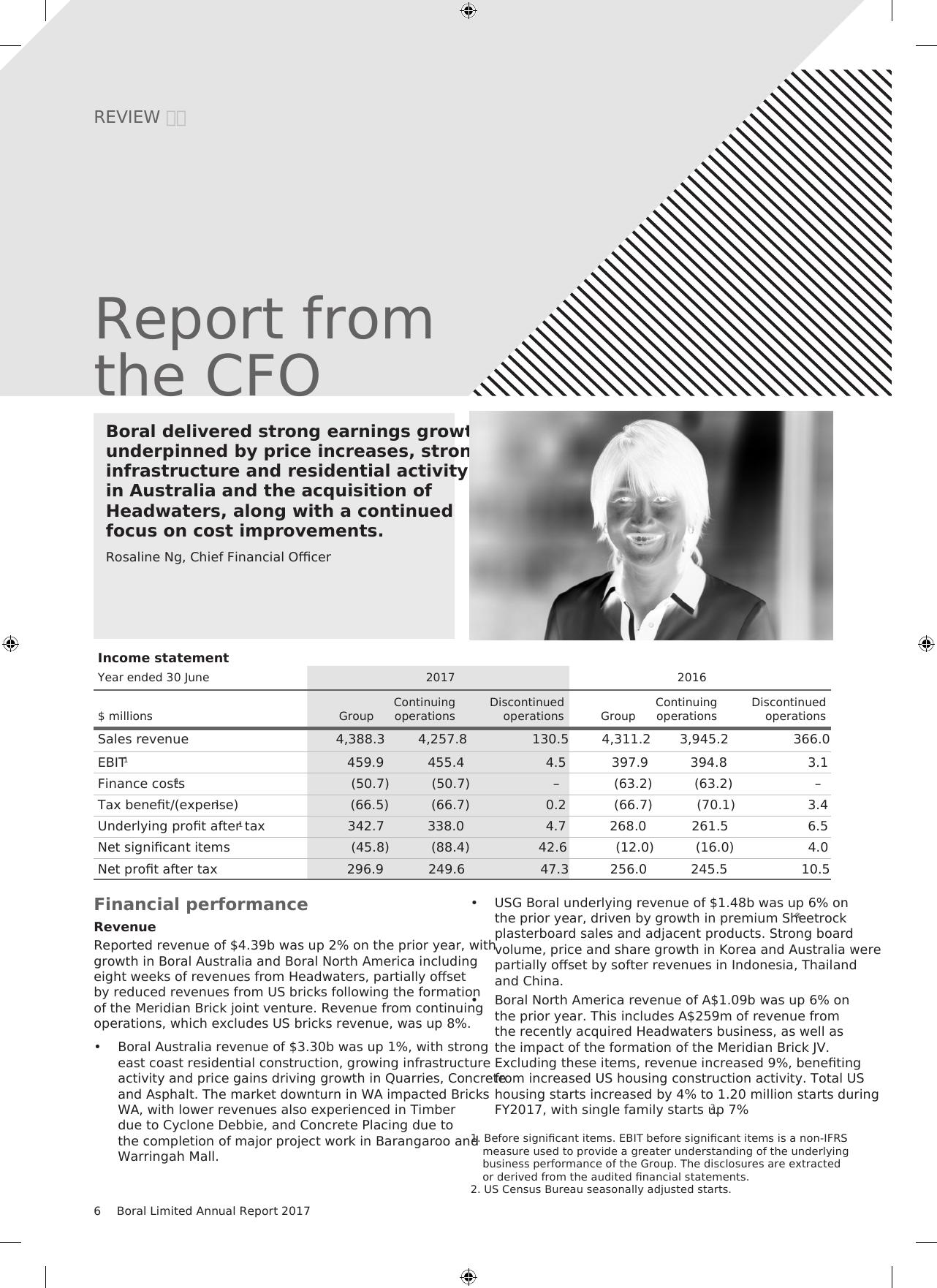
End of preview
Want to access all the pages? Upload your documents or become a member.
Related Documents
Harvey Norman Holdings Limited Annual Report 2017lg...
|153
|91705
|131
Harvey Norman Holdings Limited 2019 Annual Reportlg...
|151
|97151
|83
Reliance Worldwide Corporation Limited Annual Report 2017lg...
|76
|39216
|433
Wesfarmers Annual Report 2018lg...
|81
|100027
|95
JB Hi-Fi Annual Report 2017: Financial Performance, Sales Growth, and Dividend Increaselg...
|108
|51927
|393
Review of Financial Reporting Disclosures on Property, Plant and Equipment (PPE) in the Australian Corporate Sectorlg...
|10
|2173
|210